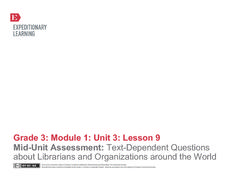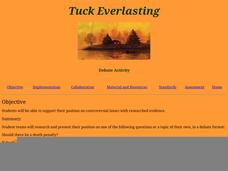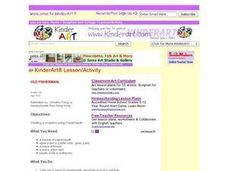Curated OER
Animals of the Arctic
Sixth graders research an Arctic animal. They survey the questions in the Animal Report in order to conduct their research. They investigate their chosen animal by using the Internet, library books and reference books.
Curated OER
Alphabetize For A Reason
Learners organize information by using the alphabet. Students organize materials alphabetically. Learners alphabetize with the first, second and third letters of a set of words. Students discover applications for alphabetical order.
Curated OER
Measuring Real Stuff
Looking for a good lesson plan on measurement? This one could be for ytou! Learners select and use appropriate nonstandard units to measure and compare lengths and weights of real-life objects. They use problem-solving skills to design a...
Curated OER
Bounce into Speedy Reading: Growing Fluency and Independence
Increased reading comprehension begins with decoding and automatically recognizing words, which is the focus of this instruction. Using their choice of six different Winnie the Pooh stories, partners practice a variety of strategies...
Curated OER
Barrels and Buckets: Access to Water - What Would It Be Like to Live in Africa?
Students compare water access in the United States with that of Africa. In this water access lesson, students located Ghana and Kenya on a globe before reading Peace Corps Volunteer accounts of the difficulty of accessing clean water....
Curated OER
Conventions - Punctuation Research
Study unusual punctuation marks in this punctuation lesson. Young grammarians work in small groups to research one of the unusual punctuation marks (semi-colon, colon, dash, comma, ellipses, or quotation marks) and discuss how the mark...
Council for Economic Education
Production Possibilities Curve
Demonstrate the important economic principles of the production possibilities curve, including how to calculate opportunity cost and graph curves by using a table or calculation. Learners use a variety of methods, including videos,...
Curated OER
Introduce Vocabulary: Have You Seen Bugs? (Oppenheim)
Are your scholars interested in bugs? Get future entomologists excited about vocabulary through Joanne Oppenheim's colorful book Have You Seen Bugs? They use the informational text (although this strategy is useful for any book) to...
Hawaiʻi State Department of Education
Reporting on History
Have fun with history and turn your kids into news reporters of the past. Each group will research, script, and deliver a news report on a historic event they are studying in class. They'll identify the main characters of the historical...
EngageNY
Mid-Unit Assessment: Answering Text-Dependent Questions About Librarians and Organizations Around the World
This is a skills-based assessment that asks test takers to use textual evidence to determine the main idea of an excerpt from an informational text as well as respond to text-dependent questions. The assessment is the middle point...
LABScI
The Rutherford Atomic Model: Hidden Obstacles
Historically, scientists had to be creative to study subatomic structure. Scholars step into their minds to recreate the procedure Rutherford used to create his atomic model. Learners identify the creative efforts of early scientists...
Curated OER
Spider Watching
Spiders are creepy, crawly - and interesting! Young entomologists learn about parts of a spider's body, their habitats, ways spiders catch their prey, and what they most like to eat. Some excellent art activities are included in the plan...
Curated OER
Science: Schoolyard Trees
Sixth graders choose specific trees to research while taking a nature walk around the schoolyard. They discuss tree and leaf parts and observe various types of leaves. After writing their reports, 6th graders present them to the class...
Curated OER
Space Flight Simulation
Learners engage in the study of flight with the help of a computer flight simulation. They take part in a variety of activities that imitate the Space Shuttle Endeavor. Students work as teams like the astronauts would to complete mission...
Curated OER
Independent Harmonies
Independent harmonies, homophonic music, intervals, and melody are all part of music theory and practice. Prepare your budding musicians for the big time with these activities focused on playing with accompaniment. This lesson is...
Curated OER
Mythology: Reader's Theater
Build reading fluency and classroom community with a Reader’s Theater activity. Class groups select a myth, or if part of a myth writing unit, select a group member’s myth, craft a script, and perform for the class. Directions for...
Alabama Department of Archives and History
Montgomery Bus Boycott: We Would Rather Walk!
Have historians use primary sources to learn about the circumstances and implementation of the Montgomery Bus Boycott, and think about the issue of boycotts as a means of effecting social change. Wrap it up with a...
Sacramento State Masters of Educational Technology
Tuck Everlasting: Debate Activity
Use Tuck Everlasting as a springboard for a debate on big ideas about immortality and the death penalty. Take a week for research and debate by following the steps outlined in this plan. Tapping into technology for help, small groups...
Curated OER
Lesson 2: The Constitution: Our Guiding Document
Explore the structure and content of the US Constitution in the second lesson of this five-part social studies series. A collection of activities, games, and videos complement a class reading of a document summarizing the US...
Perkins School for the Blind
Tactile Journals
I absolutely love this idea. Children with visual impairments create tactile journals which describe an event from the previous week in an artistic way. They verbally describe one event from the previous week and then use a wide array of...
Baylor College
The Variety and Roles of Microbes
Mini microbiologists play a card game in which they group microorganisms by groups: virus, fungus, protist, or bacteria. Then they identify the roles different microbes play in the natural world and explore how humans effectively use...
Baylor College
Defending Against Microbes
In the preceding instructional activity from the unit, beginning biologists discovered that microorganisms are everywhere, so the question follows, why are we not sick all of the time? Class members read and discuss an article in small...
Curated OER
Palace Adventure
Young language arts learners write and illustrate a short fantasy story based on the book Corduroy. First, learners need to develop a character. Then, through their writing and illustrations, they take their characters on adventures...
Curated OER
Old Fisherman
Sculpting is a lot of fun and it stimulates multiple senses at once. Learners observe and then create a fisherman (or any person) out of paper clay. They mold and sculpt their clay until they have shaped a person. They then paint and...























